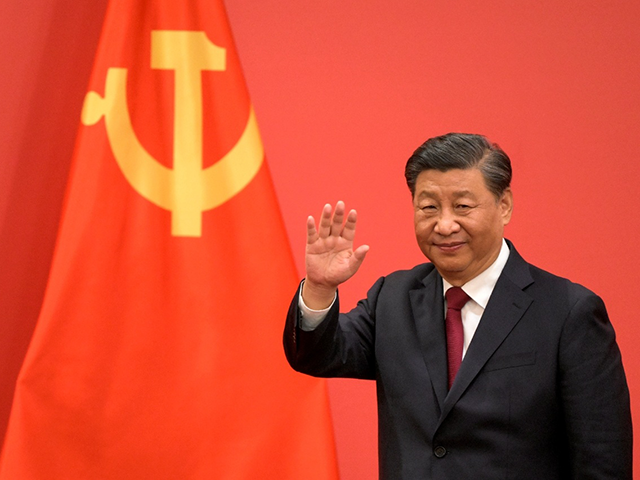Chinese dictator Xi Jinping announced the launch on Wednesday of something called the “Global Civilization Initiative,” a plan to establish a “global network for inter-civilization dialogue and cooperation” in pursuit of “diversity” and “tolerance.”
China is currently engaging in a genocide of multiple ethnic groups, most prominently the Uyghur people of occupied East Turkistan. The Chinese Communist Party has also implemented multiple laws in the past decade meant to erase local cultures, particularly in East Turkistan, Tibet, and Inner Mongolia, forcibly separating children from their families, imposing the alien Mandarin language on local cultures, and essentially outlawing any religion not directly regulated by the state.
Despite China’s preeminent role as the world leader in genocide since at least 2017, Xi told leaders assembled for a virtual meeting on Wednesday between Chinese Communist Party leaders and others sympathetic to the cause that Beijing wanted to lead in “advocating the common values of humanity.” Xi listed these, according to the state-run Global Times, as “peace, development, equity, justice, democracy, and freedom.”
“Xi stressed that tolerance, coexistence, exchanges and mutual learning among different civilizations play an irreplaceable role in advancing humanity’s modernization process and making the garden of world civilization flourish,” the Times relayed, “as the future of all countries is closely connected nowadays.”
The dictator did not elaborate on how, exactly, the “Global Civilization Initiative” would work to promote those values, or what sort of institutions or events it could consist of. To the extent that Chinese media reports explained the program, they described Xi as building “a global network for inter-civilization dialogue and cooperation” to “jointly advance the progress of human civilizations.”
The program is the third in a series of vague proposals introduced publicly by Xi himself, following the “Global Development Initiative” and the “Global Security Initiative.” The Chinese government has not explained how, or if, the Global Development Initiative differs from the Belt and Road Initiative (BRI), a global plan in which China offers predatory loans to poor countries to be used to pay China for unsustainable, expensive infrastructure projects. The goal of the Global Security Initiative, in turn, appears to be to convince participating states to abandon their individual national security interests in the service of an undefined global good.
China’s CGTN state broadcaster further reported Xi as describing the “Global Civilization Initiative” as promoting “respect for diversity of civilizations, advocating the common values of humanity, highly valuing the inheritance and innovation of civilizations, and jointly advocating robust international people-to-people exchanges and cooperation.”
“Countries need to keep an open mind in appreciating the perceptions of values by different civilizations and refrain from imposing their own values or models on others and from stoking ideological confrontation,” Xi reportedly said.
Under Xi Jinping, China has initiated multiple Han supremacist ethnic cleansing programs and at least one campaign that human rights experts broadly agree constitutes genocide – a far cry from Xi’s encouragement of other states to show “respect for diversity of civilizations.” An independent tribunal of human rights experts and international legal scholars, the Uyghur Tribunal, concluded in 2021 that China was “beyond a reasonable doubt” guilty of genocide in East Turkistan as multiple actions by the government fulfill the legal definition of the term.
In East Turkistan, Xi Jinping ordered the construction in 2017 of a sprawling network of concentration camps for Uyghurs and other non-Han ethnic groups in the region. At their peak, the camps are believed to have housed as many as three million people. China has not denied their existence but has denied that they are concentration camps, calling them “vocational education and training” centers.
In the centers, survivors testified to the Uyghur Tribunal that Chinese government agents indoctrinated prisoners into communism, forced them to renounce their faith (Uyghurs are predominantly Muslim), enslaved them, and subjected them to a gruesome list of tortures, including beatings, sleep deprivation, electroshock, and gang rape. The women, they testified, were forcibly sterilized or had their unborn children killed; some had their infant children mysteriously die in government custody.
Under tremendous international pressure, China has moved many of the concentration camp victims out of the facilities. Human rights experts believe many, however, were simply moved to factories, cotton farms, and other facilities across the country and remain enslaved. The Chinese Internet, human rights advocates have documented, is littered with government-backed advertisements selling Uyghurs as slaves.
“[O]nly by respecting the diversity of civilizations will it be possible for exchanges to be conducted among different cultures on an equal basis,” the Chinese regime newspaper China Daily proclaimed on Thursday, describing the goals of the “Global Civilization Initiative.” “It is mandatory for people from different cultures to conduct exchanges in order to constantly update and expand the common values of humanity.”
“The modernization of humanity should be like a garden where a hundred flowers bloom,” the article continued, an apparent reference to Mao Zedong’s “Hundred Flowers” campaign. In 1956, Mao announced a government-led initiative to encourage the free expression of political opinions, “letting a hundred flowers bloom and a hundred schools of thought contend.” Soon thereafter, Mao announced the project had resulted in too many “weeds” and purged all those who had expressed any dissent from Maoist orthodoxy.

COMMENTS
Please let us know if you're having issues with commenting.